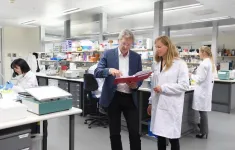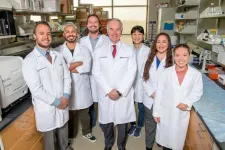(Press-News.org) SAN ANTONIO, June 21, 2024 – Liver transplants associated with alcohol-related disease are growing at a rapid pace, shifting research to address pathologies behind the ailments in light of a limited supply of organ donors.
At the forefront is Mengwei Zang, MD, PhD, an internationally recognized leader in chronic liver disease research at The University of Texas Health Science Center at San Antonio (UT Health San Antonio) who was just awarded a groundbreaking five-year, $2.53 million grant from the National Institute on Alcohol Abuse and Alcoholism, part of the National Institutes of Health.
Zang, professor at the university’s Sam and Ann Barshop Institute for Longevity and Aging Studies and the Department of Molecular Medicine at the Joe R. and Teresa Lozano Long School of Medicine, will use the funding to develop innovative approaches to investigate the pathological mechanisms underlying alcohol-associated liver disease.
The research represents a scientific frontier in the study of alcoholic liver disease, proposing abnormalities in RNA splicing as a new causative factor. It could result in new treatments to forestall or reduce the need for transplants.
“Early transplantation for alcohol-associated liver disease is currently the fastest-growing reason for liver transplants,” Zang said, “highlighting the real urgent need to study the mechanisms driving the pathogenesis of alcohol-induced liver damage.”
Alcohol-associated liver disease accounts for half of liver disease-related deaths, and its rates are rising worldwide. The main characteristic of alcohol-associated liver disease is excess fat in liver cells. Without proper intervention, it may progress to life-threatening conditions such as cirrhosis and liver carcinoma.
Although liver transplantation is only one treatment option available, concerns persist about the short supply of donor livers and the risk of patients relapsing into alcohol use disorder post-transplantation.
As a result, many patients lack access to life-saving treatments, while others continue to have poor health even after receiving a transplant.
To address this challenge, Zang has led recent research showing that the lipogenic process is a critical factor in the initiation and progression of alcohol-associated liver disease. Particularly, excessive ethanol consumption induces lipid or fatty acid accumulation and disrupts hepatocyte homeostasis, which refers to the stability of a cell type important to many liver functions.
Ethanol, in this case, doesn’t refer to the fuel additive at the gas pump, but rather a diluted form present in alcoholic drinks. Alcohol-induced lipid accumulation in hepatocytes triggers an amplified inflammatory response and hepatocyte death within the liver, posing a significant threat to health and eventually culminating in death.
RNA splicing as a factor
Ribonucleic acid, or RNA, is a molecule present in the majority of living organisms, and messenger RNA, or mRNA, carries codes from DNA that essentially tell the body how to make specific proteins.
RNA splicing is a critical cellular process in which a precursor mRNA transcript is transformed into mature mRNA. It works by removing introns, or non-coding regions of RNA, and splicing back together exons, or coding regions, which enables the production of diverse proteins from a single gene.
For the new study by Zang’s team, investigators have proposed RNA splicing abnormality as a factor that contributes to dysregulated lipid metabolism in hepatocytes exposed to alcohol.
The team will use innovative RNA sequencing, to reveal the presence and quantity of RNA molecules or spliced isoform, and lipodomics approaches, referring to the large-scale study of pathways and networks of cellular lipids. They will combine that with the use of tissue-specific knockout mouse models, in which genes of interest are inactivated in mice, to uncover the root causes of alcohol-associated liver disease.
Zang, as principal investigator, emphasizes that the study is focused on addressing major health challenges associated with alcohol use disorder, such as understanding the complexities of metabolic disorders and liver damage through interdisciplinary collaboration and impactful research.
She will collaborate with Xianlin Han, PhD, professor, and Masahiro Morita, PhD, assistant professor, both with the Barshop Institute; and Zhijie "Jason" Liu, PhD, associate professor and CPRIT Scholar in Cancer Research with Mays Cancer Center and the Institute of Biotechnology of the Department of Molecular Medicine at UT Health San Antonio.
Their efforts will focus on understanding if and how specific RNA splicing abnormalities contribute to the pathogenesis of alcohol-related liver damage, in an effort to develop targeted treatment strategies.
"Our investigation aims to discover novel targets and more reliable, effective treatments for alcohol-related liver injury that often progresses to liver failure and other organ damage," Zang said. “Our objective is to combat the epidemic of alcohol-associated liver disease and to provide more treatment options for the alcohol use disorder patient population.”
UT Health San Antonio is a primary driver of San Antonio’s $44.1 billion health care and biosciences sector, and is the largest academic research institution in South Texas with an annual research portfolio of $413 million.
The University of Texas Health Science Center at San Antonio (UT Health San Antonio) is one of the country’s leading health science universities and is designated as a Hispanic-Serving Institution by the U.S. Department of Education. With missions of teaching, research, patient care and community engagement, its schools of medicine, nursing, dentistry, health professions, graduate biomedical sciences and public health have graduated more than 43,886 alumni who are leading change, advancing their fields and renewing hope for patients and their families throughout South Texas and the world. To learn about the many ways “We make lives better®,” visit UTHealthSA.org.
Stay connected with The University of Texas Health Science Center at San Antonio on Facebook, Twitter, LinkedIn, Instagram and YouTube.
The Sam and Ann Barshop Institute for Longevity and Aging Studies is one of the world’s premier institutes dedicated to the study of age-related diseases. The Barshop Institute is the only aging-intensive research institute in the country to have four peer-reviewed designations: two National Institute on Aging (NIA)-funded centers (Nathan Shock and Claude D. Pepper centers), a testing site of the NIA-sponsored Interventions Testing Program, and a U.S. Department of Veterans Affairs Geriatric Research, Education and Clinical Center.
END
UT Health San Antonio researcher awarded five-year, $2.53 million NIH grant to study alcohol-assisted liver disease
Groundbreaking study could help reduce the need for transplants
2024-06-21
ELSE PRESS RELEASES FROM THIS DATE:
Giving pre-med students hands-on clinical training
2024-06-21
A group of pre-medical students received valuable hands-on clinical training during a workshop in the new Smart Hospital at The University of Texas at Arlington.
The Clinical Experience Workshop allowed 10 pre-med students to participate in experiential activities and to interact one-on-one with “patients” portrayed by students from the UTA Department of Theatre Arts.
“This was a clinical opportunity for pre-med students with no clinical background to be immersed in clinical medicine, learn basic skills, and experience actual patient encounters with simulated patients ...
CAMH research suggests potential targets for prevention and early identification of psychotic disorders
2024-06-21
A new study by the Centre for Addiction and Mental Health (CAMH), entitled Mental Health Service Use Before First Diagnosis of a Psychotic Disorder and published in JAMA Psychiatry, found that nearly 75 per cent of young Ontarians with a psychotic disorder had at least one mental health service visit within the three years prior to their first diagnosis of the disorder.
The retrospective cohort study—one of the largest of its kind—suggests that youth with a psychotic disorder are nearly four times as likely to have a previous mental health-related hospital ...
Mapping the heart to prevent damage caused by a heart attack
2024-06-21
Scientists at the Victor Chang Cardiac Research Institute in Australia have produced a first of its kind integrated map of heart cells which unlocks the process of cardiac fibrosis – a major cause of heart failure.
The discovery opens new avenues to develop targeted drugs to prevent scarring damage caused after a heart attack.
During and after a heart attack, the heart’s muscles are damaged leading to the formation of scar tissue which lacks the elasticity and contractility of healthy heart muscle. This damage is permanent and can affect ...
Study challenges popular idea that Easter islanders committed ‘ecocide’
2024-06-21
Some 1,000 years ago, a small band of Polynesians sailed thousands of miles across the Pacific to settle one of the world’s most isolated places—a small, previously uninhabited island they named Rapa Nui. There, they erected hundreds of “moai,” or gigantic stone statues that now famously stand as emblems of a vanished civilization. Eventually, their numbers ballooned to unsustainable levels; they chopped down all the trees, killed off the seabirds, exhausted the soils and in the end, ruined their environment. Their population and civilization collapsed, with just a few thousand people remaining when ...
Chilling discovery: Study reveals evolution of human cold and menthol sensing protein, offering hope for future non-addictive pain therapies.
2024-06-21
Chronic pain affects millions worldwide, and current treatments often rely on opioids, which carry risks of addiction and overdose.
Non-addictive alternatives could revolutionize pain management, and new research targeting the human protein which regulates cold sensations, brings scientists closer to developing pain medications that don't affect body temperature and don't carry the risks of addiction.
Research published in Science Advances on June 21, led by Wade Van Horn, professor in Arizona State University’s School of Molecular Sciences and Biodesign ...
Elena Beccalli, new rector of Università Cattolica del Sacro Cuore, takes office on 1st July
2024-06-21
Elena Beccalli will be rector of the Università Cattolica del Sacro Cuore on 1st July for the four-year term 2024–2028. After being appointed by the University's Board of Directors, which convened today, Thursday 20 June 2024, Professor Beccalli succeeds Professor Franco Anelli. She is the first woman appointed to this role in the history of our university.
The decision of the Board of Directors follows the appointment of Professor Elena Beccalli, Dean of the School of Banking, Finance, and Insurance ...
Pacific Northwest Research Institute uncovers hidden DNA mechanisms of rare genetic diseases
2024-06-21
Seattle, WA — June 21, 2024 — Researchers at the Pacific Northwest Research Institute (PNRI) and collaborating institutions have made a groundbreaking discovery that could significantly advance our understanding of genomic disorders. Their latest study, funded by the National Institutes of Health[1] and published in the journal Cell Genomics, reveals how specific DNA rearrangements called inverted triplications contribute to the development of various genetic diseases.
Understanding the Study
Genomic disorders occur when there are changes or mutations in DNA that disrupt normal biological functions. These can lead ...
Empowering older adults: Wearable tech made easier with personalized support
2024-06-21
(Toronto, June 20, 2024) A new review in the Journal of Medical Internet Research, published by JMIR Publications, found that community-dwelling older adults are more likely to continue using wearable monitoring devices (WMDs), like trackers, pedometers, and smartwatches, if they receive support from health care professionals or peers.
The research team from The Hong Kong Polytechnic University, led by Dr. Arkers Kwan Ching Wong, reviewed data from 3 randomized controlled trials involving over 150 older adults. The evaluation showed that the interventions that focused on increasing awareness of being monitored and used collaborative goal-setting and feedback tools, such as the SystemCHANGE ...
Pennington Biomedical researchers partner on award-winning Long Covid study
2024-06-21
Dr. John Kirwan, Executive Director of Pennington Biomedical Research Center, is serving as a co-principal investigator on the Pathobiology in RECOVER of Metabolic and Immune Systems, or PROMIS, study. The study has been awarded more than $802,000 by the National Institutes of Health to identify potential causes of Long COVID.
“The PROMIS study will help us better understand what is driving Long COVID,” Dr. Kirwan said. “In the early days of the pandemic, Pennington Biomedical directed its resources to address the urgent health needs of our population. Now with estimates that more than 25 percent of people in the U.S. who had COVID have experienced ...
Cooling ‘blood oranges’ could make them even healthier – a bonus for consumers
2024-06-21
An orange teeming with antioxidants and other health benefits may be a shot in the arm for consumers and citrus growers, if the fruit is stored at cool temperatures, a new University of Florida study shows.
But it’s too soon to know if the so-called “blood oranges” are a viable crop for the Florida citrus industry, says Ali Sarkhosh, a UF/IFAS associate professor of horticultural sciences. Sarkhosh’s post-doctoral associate Fariborz Habibi explains further.
“Although blood oranges typically command higher prices than other common varieties, such as navel or ...
LAST 30 PRESS RELEASES:
Yale study challenges notion that aging means decline, finds many older adults improve over time
Korean researchers enable early detection of brain disorders with a single drop of saliva!
Swipe right, but safer
Duke-NUS scientists identify more effective way to detect poultry viruses in live markets
Low-intensity treadmill exercise preconditioning mitigates post-stroke injury in mouse models
How moss helped solve a grave-robbing mystery
How much sleep do teens get? Six-seven hours.
Patients regain weight rapidly after stopping weight loss drugs – but still keep off a quarter of weight lost
GLP-1 diabetes drugs linked to reduced risk of addiction and substance-related death
Councils face industry legal threats for campaigns warning against wood burning stoves
GLP-1 medications get at the heart of addiction: study
Global trauma study highlights shared learning as interest in whole blood resurges
Almost a third of Gen Z men agree a wife should obey her husband
Trapping light on thermal photodetectors shatters speed records
New review highlights the future of tubular solid oxide fuel cells for clean energy systems
Pig farm ammonia pollution may indirectly accelerate climate warming, new study finds
Modified biochar helps compost retain nitrogen and build richer soil organic matter
First gene regulation clinical trials for epilepsy show promising results
Life-changing drug identified for children with rare epilepsy
Husker researchers collaborate to explore fear of spiders
Mayo Clinic researchers discover hidden brain map that may improve epilepsy care
NYCST announces Round 2 Awards for space technology projects
How the Dobbs decision and abortion restrictions changed where medical students apply to residency programs
Microwave frying can help lower oil content for healthier French fries
In MS, wearable sensors may help identify people at risk of worsening disability
Study: Football associated with nearly one in five brain injuries in youth sports
Machine-learning immune-system analysis study may hold clues to personalized medicine
A promising potential therapeutic strategy for Rett syndrome
How time changes impact public sentiment in the U.S.
Analysis of charred food in pot reveals that prehistoric Europeans had surprisingly complex cuisines
[Press-News.org] UT Health San Antonio researcher awarded five-year, $2.53 million NIH grant to study alcohol-assisted liver diseaseGroundbreaking study could help reduce the need for transplants






